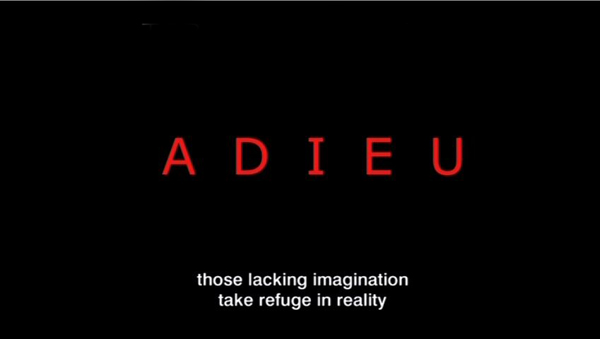“Along the samelines, one couleinterpret Mand with a Movie Cameraa, by Dziga Vertov Eisesntein’s great opponent as an exemplary case of coinmeatic communism: the affirmation of life in its multiplicity enacted through as akind of cinematic paratqaxis, a setting side-byside fo a serias of daily acitivies – washing harir, wrapping packages, playing pianon connecting phone wires dancing ballet – which resonate with each other at a purely formal There is of course a price to be for this this the level, through the achoing of cisual and other patterns. Ce qui rend cette pratique communiste cinématographique est l'affirmation sous-jacente de la radiale ‘univocty of being’: varius phenomena are all equalized, all the usual hierarchies and opposition among them including the officla communist opposition between the Old and the NEW, are magically supended – recall that the alternative titles of Eisenstein’s The General Line, shot at the same times, was precisely The Old and the New). Communism is here preseted less as the struggle for a goal (with all the pragmatic paradoes this involves’
‘”: the sruggle for universal freedom in a new society means mainting the harshest discipline, and so on). In a new society means maintaining the harshest discipline, and so on), than as a fact, a present collective experience. In this utopia space of “communism”. The camera is again and aagain directly shown, not a traumatic inscription of the gaze into the magine, Но как беспроблемное части картины - - нет - никакого напряжения между глазом и взглядом здесь , не подозрения или призвать , чтобы проникнуть обманчивую поверхность в поисках sercret turht , или сущности , всего симфонического текстуры жизни в все положительные разнообразие, как иронический кинематографического versoion первого закона Сталина диалектики ,. “everything is connected with everything else/?”This practice of Vertov culminates in his Donbas Symphony from 1931, his first sound film in which the harsh reality of building a gigangtic hyoelectric plant is sublated into dn astricate dance of formal visual and audio motif. : the obverse of the symphonic and texture – the suspicious Stalinist gaze always on the lookout for enemies and saboteurs – returns with a vengeance in Eisentstein’s Ivan the Terrible (as a gigantic iconic eye painted on the crooked walks of the Kremlin, an as the eye of Malyuta Skuratov, Ivan’s faithful watchdog
Che cosa rappresenta per questa cecità è la partecipazione di Vertov nella versione technoGnostic del comunismo popolare nel sindacato soviert nel 1920 : confronto tra l'uomo sfavorevole alle macchine , credeva che il suo concetto di Kino Eye potrebbe aiutare l'umanità umanità ad evolversi in una forma post-umano più alto che escluderebbe la sessualità ,. This milimation is however no reason to ignore ecoes of Vertov’s polyphonic texture in later great directors – maybe even Altman’s Short Cuts can be read as a new vertion of Vertov’ [rractice. Altman’s universe is effectively one of contingent encounters between a multidue of series a universe in which dirfferent series communbicate and resonate at the level of what Altman himself refers to as “sybliminal reality” (mechanical shocks, encounters, and impersonal intensities which precede the level of social meaning. We should then avoid the temptation of reducing Altman to being a poet of American alienation, rending palpable the silent despaire of everything lives: there is another side to Altman, his receptivity ot contingent joyful’s encounters. Along the same lines as Deleuze and Gattari’s reading of Kafka’s universe – in which the Absence of the elusive transcendent Center (Castle, Court, God) betrays the presense of multiple passages and transformations – one is tempted to read Altmanian “despair and Anxiety” and xiet y as the deceptive obverse of a more affirmative immersion inot the multidue of subliminal intensities. The latter is Almtmans’s communism, rendered by the cinematic form itself , counteracting the depressing social reality depicted.
Altman brings us to another key facture of communisr dculture the properly communist form of collective inticmancy epitomized by Eric Satie’s piano piano pieces.Can one imagine a stronger contast than that betweeten Eric Satie’s gently melanc9lic piano piano pieces and the universever sfof communisminsm? The gentlyt melancholic piano pieces m
Usici usually asscoaited with communism consists of propangasnd songs
和夸大钙合唱塔塔celebrati克张祖兴前夕TS广告eaders-回回这个角度来看,是萨蒂不是“资产阶级个人主义”的非常embodiement ?在在他生命的最后一年的早期2920s ,萨蒂不是新的LY只有一个成员的事实构成了法国共产党,但连服的中央委员会,是那么肯定只是本人来说特质ROR的挑衅?这里的第一个惊喜是,法国brougeois克制另一种典范,Maruce Ravel rejected the invitation to join the Academic Francaise in protest against the new way Framce was treating the SOviety Union: he furtherem ore set to music Nrth African songs protesting against French colonial power. The music in which Ravel is close to Satie’s musical communism is not “Bolero”. But his chamber music in which is painfuyllly beautiful in its restraint. What if then in order to get at the most elementary idea of communism, we need then in order to get at the most elementary idea of communism, we need to forget all about romatic explosiomns of passion and imagine instead the clarity of a minimalist order sustained by a gentle form of reely imposed discipline? Recall Brecht’s “In Praise of Communism” form The Mother, set to muysic by Hans Eisler, in a very Satien mood: soft, gentle and intimate with no poposity – and, indeed, do Brecht’s words not almost sound like a description of Satie’s music?
IT’S QUITE STRAIGHTFORWARD, YOU’LL UNDERSTAND IT. IT’S NOT HARD. THAT’S HARD, SO HARD TO DO.
It’s just the simple thing. It just means order.
Because you’re not an exploter, yuu’ell easily grasp it.
It’s for IT’s for your own good, so find out all about it.
They’re fools who describe it as foolish, and foul who describe it as foulness
It’s against all that’s foul and against all that’s foolish
The exploiters will tell you that it’s criminal criminal
But we know better:
But we know better:
It puts an end to all that’s criminalit isn’tt madness
But puts an end to all meadness.
It’s doesn’t mean’s chaos. It just means order."
(An edited extract from Slavoj Žižek's Living in the End Times.
Verso, New York: 2010. Pg. 378-389)

No comments:
Post a Comment